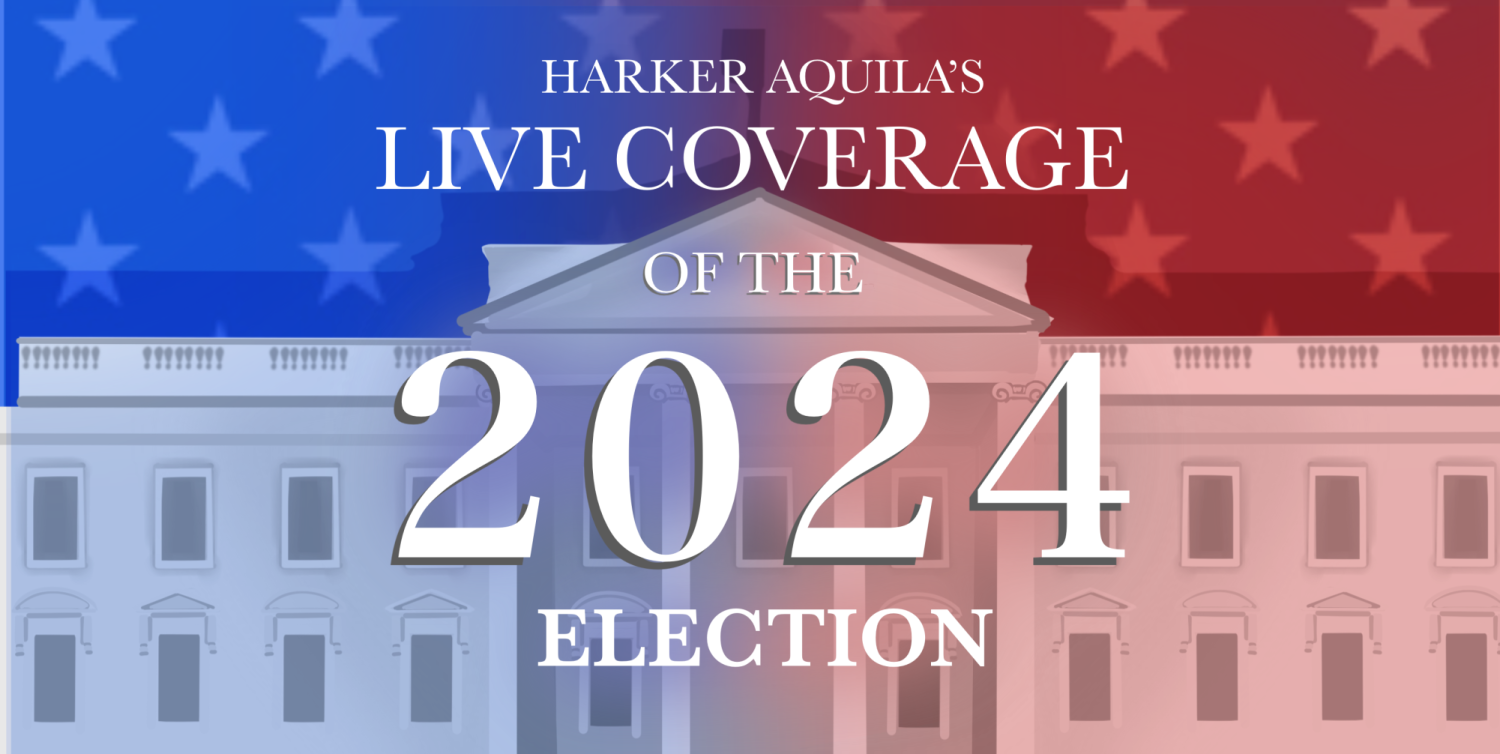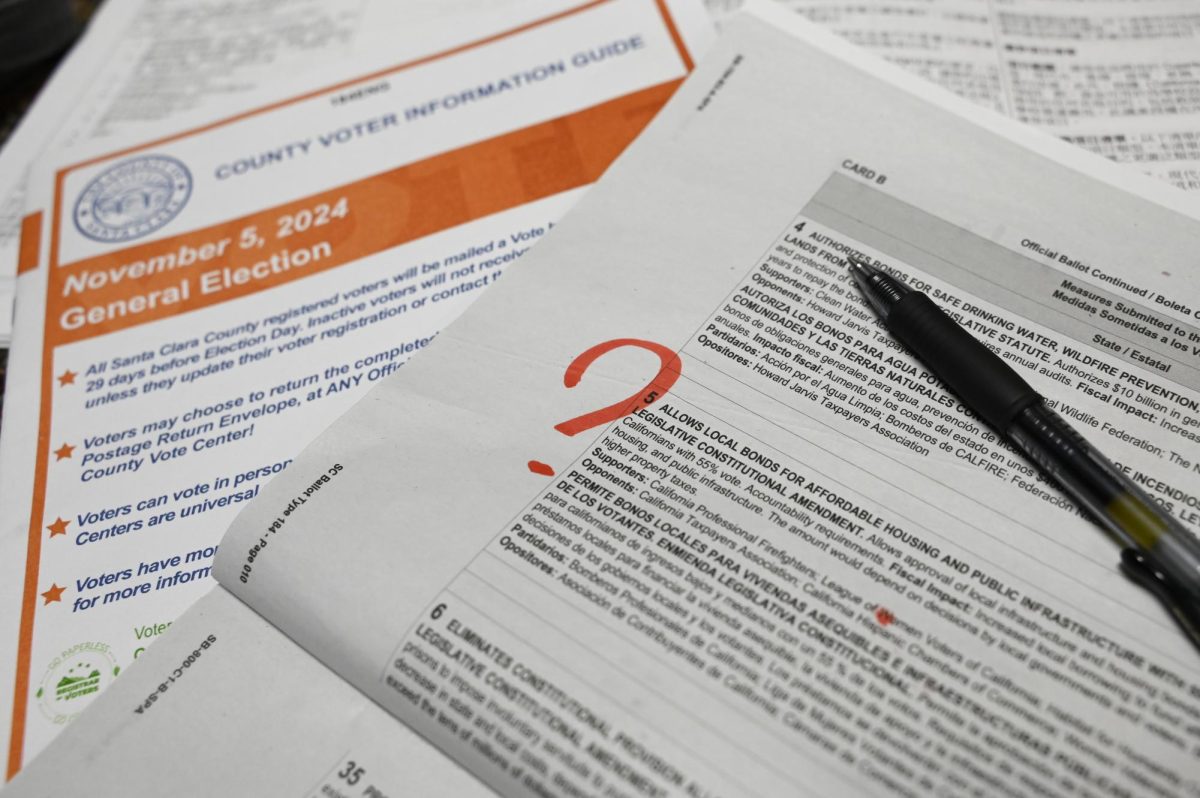This is the first installment of Campaign Conversations, where Aquila news editors Lily Shi and Jessica Hu discuss key events leading up to the 2024 presidential election with upper school community members. In this episode, they talk with Aquila managing editor Gabe Sachse (12) and Joy Hu (11) about the Harris-Trump debate on Sept. 9.
Lily: Hi, I’m Lily.
Jessica: And I’m Jessica.
Lily: And we are the co-news editors for Harker Aquila. This is Campaign Conversations, our podcast about the 2024 presidential election.
Jessica: Our first episode will focus on the Sep. 9 presidential debate between candidates Donald Trump and Kamala Harris.
Lily: Today, we are joined by senior Gabe Sachse and junior Joy Hu.
Jessica: Gabe is a Near Scholar in American history and our very own Aquila managing editor, and Joy is an extemporaneous debater. Both are interested in politics and have been following this election closely.
Lily: Can you both introduce yourselves?
Joy: Hi, I’m Joy and I’m a junior.
Gabe: Hi, I’m Gabe and I’m a senior.
Lily: I’m going to start out with a general question. What stood out to both of you most during the debate?
Joy: For me, something that was really interesting was the way the two candidates interacted with each other, since this is the first time Trump and Harris actually sat face to face. It was interesting, right off the bat, how Kamala Harris came to Trump with a handshake. Throughout the entire debate, it was especially interesting for me to look at the dynamics between the two speakers and especially how they interacted with one another.
Gabe: That’s a good point. The thing that jumped out at me most was Trump’s inability, as he has done in previous debates, to be the baiter, and more to be the baited. Harris hit on a lot of things that appear to offend him personally and got him really riled up, and he said some stuff that probably didn’t resonate with a wide swath of the electorate, as well as the moderators themselves — they had to stop themselves and point out that what he was saying was factually inaccurate.
Jessica: Harris did a lot trying to troll him into responding in certain ways. There were multiple other examples of her setting the bait, and then Trump falling for it. Do you think this strategy is effective, both for winning the debate, but also just swaying voters in general?
Joy: Looking at it in terms of Kamala Harris’s perspective, one of her key goals in terms of this debate was to really define herself for the people that were watching it. I think she really needed to, for herself, explain her policy to her constituents. Her getting Trump to take the bait, getting Trump to be on the defensive, really helped the American people, not only because she was able to talk about policy more, but also because she was able to put Trump on a defensive, have Trump attack her policies less and overall, show what a good speaker she was for the American public.
Gabe: I agree with that, and I’d like to push back against the notion that Kamala led with these kinds of jabs. They were more to illustrate the sharp divide in a perceived character of the two candidates and less to replace any sort of policy debate. You can scrutinize your policies all day, just the same as you can do with Trump’s, and you can outline the policy details, but the median American voter does not want to hear about the details of economic policy. They just want to hear the politician up on the stage say that they’re going to help them. And when Trump does things like defend his crowd sizes, things that really don’t matter to the undecided voter, then he’s kind of getting away from that and seeming out of touch. Because who, that supposedly cares about the median voter, the middle class, whoever they’re appealing to, workers in Pennsylvania, who would discuss something like that, who would say something like, “they’re eating dogs”? That’s what Harris was trying to get at. It was more of a rhetorical strategy than it was a holistic debate strategy, and I think it just dominated the coverage, not the actual run time of the hour and 40 minute debate.
Joy: I definitely agree with that. One point you brought up about how she was actually speaking to the people. That really reminded me in the moments when, whenever I watched their answers, Kamala Harris would always end off a lot of her longer answers with saying that she wanted to be the leader that brought the change. Whereas for Trump, I didn’t really see him like addressing the American people directly.
Lily: You brought up something Trump said about eating the pets. Just for our listeners, could you tell us what that was all about?
Gabe: Sure. There has been a patently false narrative surrounding what I believe is a semi-true story about someone who is not an immigrant but does live in Springfield, Ohio, eating a stray cat. There have been no actual stories of Haitian immigrants coming into communities and eating people’s pets. I think it serves to illustrate a point about his ideas of what he thinks will get people to vote for him, that he’s more willing to assign a boogeyman, be it Mexicans or Haitians or whatever group he feels will stir up the most controversy, to get people angry at rather than discuss any sort of solution. I’m not saying that Kamala went into detail about every single solution that she provided, but I do think that she did a better job at preaching unity, as you said, especially compared to bringing up some sort of baseless claim about the eating of pets.
Jessica: It seems you guys think Kamala Harris talked about topics that were more relevant at hand. But do you think she gave enough information about her plans, maybe to voters who are undecided?
Gabe: One thing that struck me about the difference in rhetoric was that while Kamala, I don’t think gave substantive enough answers for us to know exactly what she’s going to do, and also we have to acknowledge the structure of our government, in which, with the way that partisan lines are drawn nowadays, without a democratic trifecta, she won’t be able to achieve a lot of the things that she sets out. She used her wording in such a way that it appeared as if she had a very strong, and I hate to go back to go back to using the word substantive, but substantive policy plan, whereas Trump seemed to show a flawed understanding, as elucidated by the anchors as well as Harris of things like tariffs. I will acknowledge that Harris did not answer a lot of the questions directly. She just kind of read off or spoke off memorized talking points, but I think it’s reflective of kind of the rhetoric that Trump usually wins on, which is just these nonsense talking points that get people riled up to go vote for him. When you take that power away from him and you put him on the defensive, it’s a lot harder for him to do that. It’s a lot harder for him to speak in a convincing manner. And certainly, when you have someone that has a lot more energy and more feistiness than Joe Biden did in June, it makes it exponentially harder.
Lily: Do you think it is problematic that Harris did not give a lot of detail about her policies, especially for voters who wanted this debate to help them learn more about what exactly a presidential term would look like for her? And at the same time, Trump, as well, did not talk in detail about his plans. Do you think that that would be problematic for voters who are watching the debate?
Joy: First thinking about whether or not this would be problematic for Donald Trump, I don’t think this would pose a big issue for him, especially Trump’s very Republican, very MAGA base. They will stand by Trump, especially because of the rhetoric that he spouted, and they don’t necessarily care about the policies that he’s enacting or that he plans to enact because he stated similar things in the past. Whereas, Trump didn’t focus enough on undecided voters by not addressing policy enough, and it seemed like he was primarily appealing to his base. In such a close election, just appealing to the base, like we’ve seen in 2016 with how Hillary Clinton lost, isn’t necessarily the best situation. In terms of Kamala, I think this debate was, for a lot of her constituents, a way for them to actually try to understand her policies. While Kamala didn’t fully talk about all of her policies or expand on them, she did an adequate job, especially in the beginning of the debate, by explaining her policies and pushing back on a lot of the aggressive remarks made about her policies, her inconsistencies in the past, and her ties to Biden. She was able to push against that successfully.
Gabe: Let me preface this by saying that political debates, for as long as we have been socially aware or politically aware, have been more mudslinging competitions than they have been substantive policy debates. So I think the question of who outlined their policy better is a little silly, because the median voter is really, at this point, not looking for like detailed descriptions, even if we as society should be looking for said policy descriptions, they’re looking for who presents themselves better and who has the stronger rhetoric. So for Harris to come out so aggressively, and almost giving him a taste of his own medicine was probably a smart debate strategy, even if it wasn’t the most theoretically sound thing for her to do. It was an important step, surely, in ensuring that some of these undecided voters will start stumping for her, or start voting for her, that she kind of used that mudslinging technique in a more effective way than Joe Biden tried to in June, at least.
Jessica: Speaking of Biden, throughout the debate, Trump tried to kind of refer to Harris almost as if she were Biden. Especially towards the end, he kind of acted as if he was going against Biden. I recall him saying, we have a president who doesn’t even know he’s alive, where even is Biden, we’re playing with World War Three, Biden has no idea how to stop the Russia-Ukraine War. How do you think Kamala Harris is trying to break free from that?
Joy: This debate, Trump could have placed more emphasis on how Harris did have, technically, three and a half years to solve the problems that she was talking about. But I think, for one, Trump did not really push against that or push towards that as much as he should have. On Kamala Harris’s side, I think she responded rather adequately to these claims as well. If we’re talking about this era of sound bite politics, you could see, online, there were a lot of clips of her response to the claim, saying, “I’m not Biden. I’m clearly not Trump either,” and her trying to push against this as well. In terms of the broader electorate, I think something that’ll definitely play to Harris’s advantage is that many people aren’t exactly aware of what the Vice President does, and so they often see President Biden as a figurehead, and right now, not many of them still associate Harris with Biden’s policies as much as Trump could have pushed against. In that front, Harris was able to redefine herself with her rhetoric, but also by focusing on her new policies.
Gabe: I love the term soundbite politics, and I think it perfectly describes everything maybe fundamentally wrong with this debate, but also everything that went right for Kamala with this debate. But Kamala, whether or not she had the substance to truly engender confidence in those who are super politically active, appealed perfectly to, or as close to perfect as you can get to, the people that she really has to win over. She mentioned the Polish-American community somehow and connected it to the Russia-Ukraine war. That might be a nonsensical policy answer, but if you’re a Polish American, one of the 800,000 that she mentioned in her response directly, sitting at home, then you probably feel pretty good about that answer. And that is the type of thing that Harris wants. She wants people to really hear her words and have them ring out and still sound good, even on the 10th time they see that ad on television.
Lily: Could you quickly explain the Polish American comment?
Gabe: Sure thing, Vice President Harris and former President Trump were both asked about the Russia-Ukraine conflict, and after a back and forth between the two, I believe Harris was directly asked about her involvement with Putin, a question which she basically ignored. And she went on to talk about how Trump, sort of, at least allegedly by her, emulates Putin and other dictators, and how by allowing Putin to essentially take what he wants, he wouldn’t stop. For instance, by referencing the Polish Americans and by referencing Poland, which is the theoretical next country after Ukraine, that Russia would engage in conflict with, she’s using pathos to sort of appeal to these Polish Americans and to draw their votes in. And so it’s a smart strategy to use that sort of rhetoric, even if it’s not an actually politically sound answer.
Joy: Also ditto and everything Gabe said and about the Polish American thing, I think this is very illustrative of how she’s very focused in this election in terms of driving wedge issues or appealing to undecided voters.
Jessica: Moving on to another topic that kept on popping up throughout the debate, immigration. This was definitely something that Trump kept on mentioning, Harris eventually was forced to continue talking about. What are your thoughts on how the two candidates handled this specific topic?
Joy: I think going into the debate, actually immigration was supposed to be one of the points that he should have emphasized the most, as it was something that he was seen as one of the most strong across the board for many Americans. However, during the debate, we saw one example of how Harris when asked about immigration and when Trump was asked about immigration, trying to bait Trump into, you know, talking about eating dogs and cats. So in terms of Trump, I think he was a little incoherent, a little rambling when talking about immigration, and didn’t stress it enough. But in terms of Kamala Harris, I actually think she was rather successful in pushing against the notion that she was weak on immigration. For a bit of context, earlier this year, there was supposed to be a bipartisan bill to try to give more funding and give more agents across the border, but this ended up being essentially taken out of good faith negotiations by Trump, posting on Truth, telling a lot of Republicans that they should just ignore this deal and not vote for this deal. So in terms of this, Kamala Harris was able to emphasize the fact that actually, without Trump’s involvement, this deal that could help secure the border would have taken place, but instead, because of Trump, it didn’t. So I think Kamala was able to emphasize this while Trump didn’t talk enough about the things that should have guaranteed him the upper hand.
Jessica: What in particular made you guys think that Kamala Harris was proving to the audience that she was not as weak on immigration as previously made out to be? What specific things she said or topics brought up made you guys think that?
Joy: I think one of the many misconceptions a lot of potentially undecided voters had about how Democrats in general handle the border is that they are completely okay with like illegal immigrants and things like this. But in terms of Kamala Harris, we saw her taking on a more centrist policy. For example, I think for me, the key moment was when she mentioned giving more aid or giving more funding to the border police and her efforts to try to get this bill through the House and through the Senate. I think it really signaled to a lot of voters, some of them were able to get another taste of how Kamala Harris was able to be less liberal in terms of border and how she actually cared about enacting policy to do that. Whereas, on the other hand, I think Trump, his weakness in terms of not allowing this critical bill to go through really showed how he wasn’t being genuine.
Gabe: One thing that Harris benefited from throughout the debate from was her use of a humanistic strategy. She often took really macro issues and put them on a microscopic level, in the sense that she would address the real story of teenage or preteen girls having to carry babies of their rapist to term. Especially on that abortion issue, I think she referenced multiple stories like that. She also did it on the border issue when she referenced guards specifically, an officer specifically, and the idea of their suffering as they try to do their job in a jam packed and often flawed system. Just that appeal, whether it actually had any policy design behind it or not, certainly sounds better to the median voters ear than the ninth running, “We will build a wall, it will be beautiful,” and the mass deportations that often come across as inhumane and unrealistic.
Lily: That’s a good segue into talking about the issue of abortion. The discussion of abortion, I would say, was a memorable one in the debate. Like Gabe said, Harris talked very emphatically and emotionally about stories of abortion. How do you think that both candidates handled this issue?
Joy: Even for people who across America care a little less about abortion or don’t see it as one of their top issues that they’re voting for, Trump really landed low in terms of abortion. Like Gabe mentioned, Trump did flip flop a lot on these issues, especially with his VP pick JD Vance, and he was also called out for misinformation a lot of the times by the moderators as well. Although he tried to make this an issue about the nationwide and the federal governments, I just don’t think that this argument for him was effective.
Gabe: I agree with all that, and in my view, he made it more about himself than he did anything else. He talked about how beautiful his policy was, how strong it was, how freedom loving it was, how it sent it back to the will of the voters, and Harris made it about people. She used individual examples that appeal to people’s emotions, as I said, and that will always sound better to the American people than any sort of rhetoric about the candidate themselves. Even when Joe Biden brought up the story of his son and connected it to Donald Trump’s comments about the military, it didn’t it certainly did not ring hollow, but it didn’t hit as hard as Harris’s examples of these horrifying abortion or denied abortion cases that happened under what she called “Trump abortion bans.” Stuff like that that wins debates and perhaps it will win her the election.
Lily: Let’s talk a little more about Trump’s approach. Can one of you explain exactly what he said his policy was on abortion, specifically about Roe v. Wade?
Joy: Looking more broadly into his policy and how he framed it specifically in this debate as well, he actually wanted the constituents to think that Roe v Wade is this dominating force that prevents people from getting the right to choose. He said that by taking this out of the national level, by letting the local levels decide, he was the beacon of freedom, and he was the only person that dared to bring this sort of “freedom” back to the States. But what was actually really ironic about this is that many states that have had abortion on their ballot recently, some have restricted the right to abortion, but also others, for example Ohio and Kansas, actually surprisingly ruled in favor of keeping abortion access as well. This was something that Harris and the moderators called out and definitely was a weak point to Donald Trump’s overarching argument that he was bringing freedom by eliminating Roe versus Wade.
Lily: Okay, let’s take a break from the serious stuff, and I’m going to ask this question. What was your favorite quote from the debate?
Joy: For me, when asked about Obamacare, Trump said that “he had concepts of a plan,” which I’ve already seen people making like memes on Instagram about having a concept of the plan. Not only was it really funny, it also showed how Trump, even though people often criticize Kamala for being weak on policy, it actually showed how Trump wasn’t too definitive in his own policy side.
Gabe: That was my favorite quote. My personal takeaway, after years and years of being caught up in Trump world and seeing everything that he’s had to say to the nation and being politically active, and being a spectator at the clown show of American politics, I’ve noticed that he’s gotten really comfortable since 2016, when he was fiery and he was chasing Hillary Clinton around the stage. He’s gotten used to nobody ever pushing back on anything. So to hear something like, “I have concepts of a plan” nine years after concepts of a plan should have been in his mind. Regardless of whether each candidate actually presented a plan, one candidate saying that he had concepts of one and then the other saying that she had an actual plan certainly resonated differently with voters, and I think we’re going to begin to see that as polls start to roll out. At least that would be my prediction.
Jessica: Overall, I guess it could be argued that Trump said more unhinged things throughout the debate, but it’s definitely also true that the moderators pushed back on his words more than on Harris’s. Do you think this is fair?
Gabe: Yes. Say what you will about Harris’s potentially flimsy policy ideas, or her oftentimes leading rhetoric, and certainly about her baiting and how that’s not what American politics should look like, especially in the context of her more reflective approach to democracy as a whole throughout the debate, but Trump blatantly lied. He does it all the time, but he did it throughout the debate. She didn’t push back on all of them. The moderators didn’t push back on all of them. They pushed back on claims that are the newest and most destructive, things like executions after a baby is born, or the eating of cats and dogs, things like concepts of a plan or flip flopping on abortion. Those are things that journalists as the fourth estate of American democracy should be fact checking. And so yes, that meant that Trump got fact checked a lot more, but hopefully, maybe after nine years, he will learn that you cannot blatantly lie to the American people and get away with it.
Jessica: Then in general, from what I’m hearing at least, it seems as though you guys are thinking Kamala Harris won the debate. Given that, do you think this will help her win the war? Maybe she won the battle, but what does that say about the broader picture?
Gabe: I am hoping that, if nothing else, and going off no personal politics at all, this will mark a turning point in which candidates have to focus more on unifying America, as Harris at least attempted to with a lot of her words, then either tearing down each other or groups that they find to be easy scapegoats. With that being said, I don’t think it’ll give her a sizable enough bump to like the election here, it will be close, probably so close that things will get quite weird, and Trump certainly still has a very good shot at winning, but she did everything that could have been asked of her, and I think she will gain at least one or two percentage points in the polls.
Joy: I definitely agree with everything Gabe said. Although Kamala Harris, by a lot of people’s view, did end up “winning” this debate, I think overall, the entire race will be really close. After political debates, if we’re looking at the polls, the winner seems to have a slight uptick, but the election is still quite far away in November, and still we’re seeing that across states, especially competitive states, in regions like Rust Belt, the Sunbelt, we can see that races, especially for Kamala Harris, are still rather tentative and super close as well. So I think right now isn’t the time to jump to conclusions and for both managers of both candidates’ campaigns to not be too hasty about declaring a victory or taking it easy. And I also think it’s a very tangential statement to us. I think for us it’s really easy to laugh at Trump’s ridiculous statements, as we’ve done today. But also it’s incredibly important to remember that across the nation, there are people who have lost their manufacturing jobs that may have shifted to production in China or maybe in Mexico. There are people who maybe have lost their jobs in fracking or in coal. While it’s easy to dismiss either candidates’ remarks as outlandish, I think it’s important that we still continue to try to understand the other side’s perspective and take the rest of this election season as seriously as we can.
Lily: I think that’s a good place to end this discussion. Thank you both for coming, and I think we had a really good discussion today. With that, let’s conclude Campaign Conversations, Episode 1.
Jessica: We look forward to producing more episodes in the future to increase student interest and engagement in the election.


















![“[Building nerf blasters] became this outlet of creativity for me that hasn't been matched by anything else. The process [of] making a build complete to your desire is such a painstakingly difficult process, but I've had to learn from [the skills needed from] soldering to proper painting. There's so many different options for everything, if you think about it, it exists. The best part is [that] if it doesn't exist, you can build it yourself," Ishaan Parate said.](https://harkeraquila.com/wp-content/uploads/2022/08/DSC_8149-900x604.jpg)




![“When I came into high school, I was ready to be a follower. But DECA was a game changer for me. It helped me overcome my fear of public speaking, and it's played such a major role in who I've become today. To be able to successfully lead a chapter of 150 students, an officer team and be one of the upperclassmen I once really admired is something I'm [really] proud of,” Anvitha Tummala ('21) said.](https://harkeraquila.com/wp-content/uploads/2021/07/Screen-Shot-2021-07-25-at-9.50.05-AM-900x594.png)







![“I think getting up in the morning and having a sense of purpose [is exciting]. I think without a certain amount of drive, life is kind of obsolete and mundane, and I think having that every single day is what makes each day unique and kind of makes life exciting,” Neymika Jain (12) said.](https://harkeraquila.com/wp-content/uploads/2017/06/Screen-Shot-2017-06-03-at-4.54.16-PM.png)








![“My slogan is ‘slow feet, don’t eat, and I’m hungry.’ You need to run fast to get where you are–you aren't going to get those championships if you aren't fast,” Angel Cervantes (12) said. “I want to do well in school on my tests and in track and win championships for my team. I live by that, [and] I can do that anywhere: in the classroom or on the field.”](https://harkeraquila.com/wp-content/uploads/2018/06/DSC5146-900x601.jpg)
![“[Volleyball has] taught me how to fall correctly, and another thing it taught is that you don’t have to be the best at something to be good at it. If you just hit the ball in a smart way, then it still scores points and you’re good at it. You could be a background player and still make a much bigger impact on the team than you would think,” Anya Gert (’20) said.](https://harkeraquila.com/wp-content/uploads/2020/06/AnnaGert_JinTuan_HoHPhotoEdited-600x900.jpeg)

![“I'm not nearly there yet, but [my confidence has] definitely been getting better since I was pretty shy and timid coming into Harker my freshman year. I know that there's a lot of people that are really confident in what they do, and I really admire them. Everyone's so driven and that has really pushed me to kind of try to find my own place in high school and be more confident,” Alyssa Huang (’20) said.](https://harkeraquila.com/wp-content/uploads/2020/06/AlyssaHuang_EmilyChen_HoHPhoto-900x749.jpeg)












